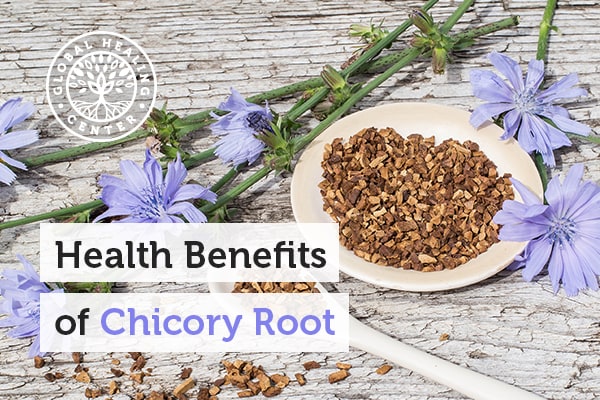
Chicory root has a long history of providing support to liver concerns. Ancient Romans used the herb to help cleanse the blood. Egyptians were known to consume chicory root in large amounts to help purify the liver and the blood. It’s popular today as a caffeine-free replacement for coffee- you may have tried it if you’ve visited New Orleans.
Digestive Support
Chicory may provide direct functional support to the digestive reactions in the body. First of all, chicory root increases the flow of bile, which supports digestion. Because extra bile helps break down fats, chicory root may help optimize blood composition and is worth consideration by anyone seeking to achieve optimal liver and gallbladder health.
Secondly, organic chicory root contains inulin, a soluble fiber that feeds digestive flora in the intestines. Many plants contain inulin, but chicory root has the highest concentration. Nourishing the healthy flora in the intestines enhances digestion. Furthermore, since inulin content is not digestible, the lack of glucose can help promote optimal blood sugar levels while also increasing stool bulk and consistency to help eliminate toxins efficiently.
Antioxidant Activity
Many herbs are high in antioxidants, which, in plants, often come in the form of compounds called phenolics. Chicory is a rich source of phenolics and their protective effects on the cardiovascular system is widely acknowledged. Chicory coffee has repeatedly been assessed for resistance to redness due to its phenolics and caffeic acid content.[1] Adding chicory root to the diet of lab rats significantly increased antioxidant levels in the blood. Researchers believe the benefit of dietary supplementation with chicory is because of its polyphenolic (antioxidant) compounds.[2]
Against Harmful Organisms
Having shown potent activity, chicory root extract has generated interest for its potential role against harmful organisms.[3] An Italian study found chicory root extract to have fungal cleansing qualities in certain situations.[4] Chicory root is toxic to strains of Salmonella at high amounts and a 28-day rat study found no side effects from large servings of chicory root extract.[5]
Relation to the Liver
In addition to its beneficial antioxidant effect, chicory root provides functional support to the liver.[6] The Zoology Department at Mansoura University in Egypt concluded chicory has a promising role worth considering for halting oxidative stress and liver injury in some situations.[7] I have incorporated chicory root in Liver Heath, my 100% all natural formula that supports the normal process designed to detoxify the liver and gallbladder.
Have you tried supplementing with chicory root? Please, let us know what benefits did you experience?
References (7)
- Schumacher E, et al. Thrombosis preventive potential of chicory coffee consumption: a clinical study. Phytother Res. 2011 May;25(5):744-8. doi: 10.1002/ptr.3481. Epub 2011 Mar 21.
- Juśkiewicz J, et al. Physiological effects of chicory root preparations with various levels of fructan and polyphenolic fractions in diets for rats. Arch Anim Nutr. 2011 Feb;65(1):74-87.
- Petrovic J, et al. Antibacterial activity of Cichorium intybus. Fitoterapia. 2004 Dec;75(7-8):737-9.
- Mares D, et al. Chicory extracts from Cichorium intybus L. as potential antifungals. Mycopathologia. 2005 Aug;160(1):85-91.
- Schmidt BM, et al. Toxicological evaluation of a chicory root extract. Food Chem Toxicol. 2007 Jul;45(7):1131-9. Epub 2007 Jan 11.
- Atta AH, et al. Hepatoprotective Effect of Methanol Extracts of Zingiber officinale and Cichorium intybus. Indian J Pharm Sci. 2010 Sep;72(5):564-70. doi: 10.4103/0250-474X.78521.
- Hassan HA, Yousef MI. Ameliorating effect of chicory (Cichorium intybus L.)-supplemented diet against nitrosamine precursors-induced liver injury and oxidative stress in male rats. Food Chem Toxicol. 2010 Aug-Sep;48(8-9):2163-9. doi: 10.1016/j.fct.2010.05.023. Epub 2010 May 15.
†Results may vary. Information and statements made are for education purposes and are not intended to replace the advice of your doctor. If you have a severe medical condition or health concern, see your physician.







